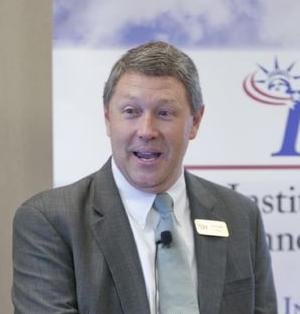
Tom Giovanetti is president of the Institute for Policy Innovation (IPI), a 38-year-old conservative, free-market public policy “think tank” based in Dallas, Texas.
In addition to his administrative and fundraising duties, Tom writes for IPI and for leading publications on a variety of policy topics including tax policy, economic growth, self-government, civil liberties and constitutional protections, judicial supremacy, intellectual property, Social Security personal accounts, technology and Internet policy, and government spending. In addition to being regularly published in major outlets including the Wall Street Journal, Washington Times, FoxNews.com and The Dallas Morning News, Tom writes often for the Fort Worth Star-Telegram. Tom frequently appears in the media and is a regular guest and occasional substitute host of the Mark Davis Show in the Dallas-Fort Worth market.
Tom loves thinking out-of-the-box to design novel solutions to policy problems and explaining complicated policy issues in ways average folks can understand.
Tom's mission at IPI is to use issues to teach conservative, free market thinking and to push back against unprincipled populism. He seeks to encourage continued skepticism of Big Government, to maintain faith in markets, and to defend individual liberty as the best means of achieving human flourishing. His most recent work has focused on free market solutions to student loan debt, preserving online freedom, and persuading state legislatures to override local and municipal rules that restrict economic liberty.
Mr. Giovanetti has represented IPI at many national and international organizations, including the World Intellectual Property Organization (WIPO), the Internet Governance Forum (IGF), and represented IPI during negotiations on the Trans-Pacific Partnership (TPP) trade agreement. Mr. Giovanetti is a popular speaker and writer and testifies before state and federal legislative committees on a variety of topics.
Follow Tom on Twitter (X) at @tgiovanetti
Secondary Markets: The Ticket to Economic Success
The societal benefits of the secondary ticket market depend on the right of ticket purchasers to transfer their tickets as they choose.
Coalition Letter to Congress Regarding U.S. Sugar Policies
IPI joins with the American Conservative Union and other free market advocates urging a halt to all market-manipulating sugar policies world wide.
Tax Reform as a Diversion
It was a disappointment to see President Obama use tax reform as little more than a bait-and-switch for his same old demand for higher taxes and more federal spending.
Copyright, Control and Censorship
The copyright review process can be a helpful occasion to update copyright law, but it should not give credence to baseless criticisms manufactured for ideological purposes.
Independence Day and Taxes
There’s nothing more authentically American than complaining about high taxes, and taking action against an unresponsive, unrepresentative government.
We Can't Afford this Tax System
We can simply no longer afford an uncompetitive corporate tax rate that is wildly out of whack with our international competitors.
Getting Knowledge Policy Right
In a knowledge economy, you have to get knowledge policy right. Too much is at stake.
Time to Stop the Wireless Tax Grab
The Wireless Tax Fairness Act, newly reintroduced this week, would put a five-year moratorium on any new state and local discriminatory wireless taxes.
Time to Stop the Wireless Tax Grab
The Wireless Tax Fairness Act, newly reintroduced this week, would put a five-year moratorium on any new state and local discriminatory wireless taxes.
Comments to the ITC in the Matter of Electronic Digital Media Devices
Urging the ITC to forbear from issuing further exclusion orders in this matter, in order to discourage the forum shopping that brought these cases to the ITC.



